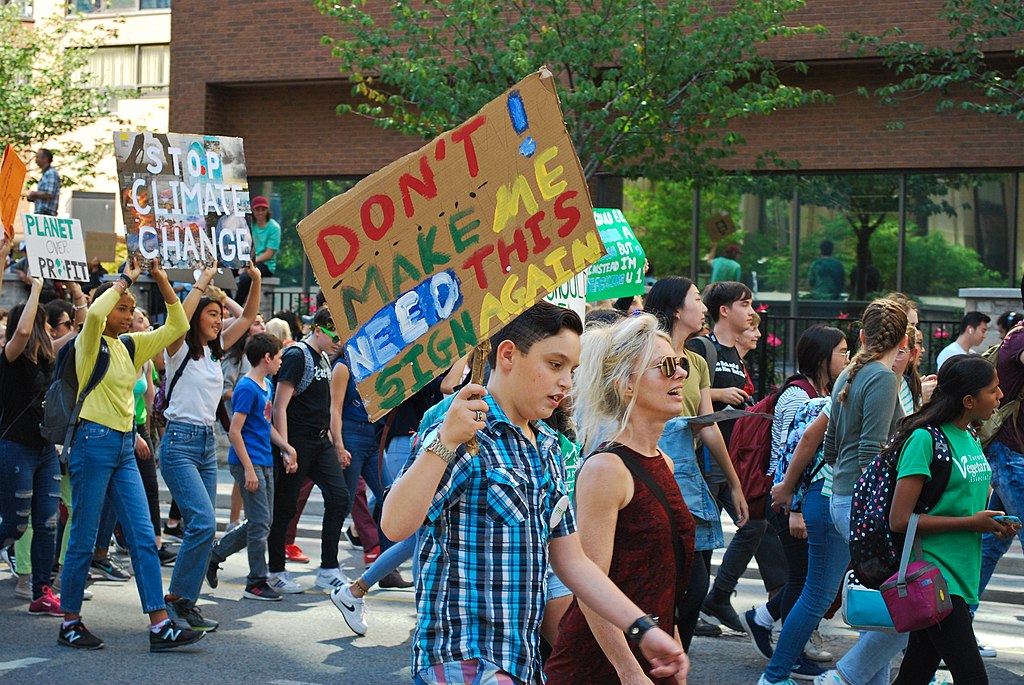Our children are on the right side of history in demanding climate action
Young people understand that rising temperatures are the single biggest threat to their future. Will we heed their call?
O
ur young people have never known a world without global warming. Many have experienced the ravages of climate change first-hand – from forest fires in California to drought in the Sahel. Kids in Florida and the Seychelles know that their communities may soon disappear under rising seas. In Delhi and Beijing, they know that the air they are forced to breathe is like smoking 50 cigarettes a day. Theirs is a generation that is about to inherit an uninhabitable planet.
In their eyes, the fact that their elders have done so little to combat climate change amounts to the biggest abdication of responsibility of our times. That is why they are taking matters into their own hands by striking to demand urgent climate action. The youth strikes have spread so far and so fast that they are now a global phenomenon. So the questions for us adults are: How should we respond? How do we involve our young people in critical decisions that will determine their future? How do we give them hope?
First, we should start by acknowledging that those who have contributed the least to global warming – the very young and the very poor – are the ones who stand to lose the most. Then we should listen to them. They, far more than most adults, have registered the stark warnings of raging storms, droughts, extreme heat and poverty for hundreds of millions of people. These global youth strikes are a wake-up call. Climate change is a problem for all of us – but that also means we can all act.
Second, more of the world’s leaders in business and politics need to make climate change, and especially efforts to accelerate adaptation to bring it in line with mitigation, their overriding priority. Some already have, but not nearly enough of them to change the trajectory of rising temperatures. We need more leaders like Angela Merkel, the German Chancellor, who says global warming is a “challenge that people can only tackle together”. More leaders need to grasp – as our young people already do – that a global problem requires global solutions and coordinated action.

Third, we need to harness the passion that has driven the climate strikes and use it as a catalyst for global action. We owe it to the generation that will succeed us. Technical and political solutions already exist to reduce our carbon emissions – and where climate change is already affecting lives, there are ways of strengthening the resilience and ability of communities to adapt. The story can be one of opportunity, creating more jobs, economic growth and greater prosperity even as disaster is being averted.
There is also room for optimism. Our children should know that communities all over the world are taking steps to make themselves more resilient to climate change. Not all solutions to such challenges are costly or require expensive technology.
In Ahmedabad, an Indian city of more than seven million inhabitants, homeowners are whitewashing their roofs – a simple measure that reflects sunlight and helps lower temperatures not only inside the house but also on the roof itself, where many people go to sleep at night. Up there the difference can be as much as 30 degrees. Meanwhile in Africa, drought-resistant crops and digital planning tools are transforming the lives of smallholders.
Cities from Melbourne to New York are planting trees to increase shade in summer and reduce deaths caused by heat stroke. The citizens of Miami are so serious about climate adaptation that in 2017 they voted to increase taxation to pay for better flood defences and more water pumping stations. Miami knows what studies already show: that every dollar spent now on resilience and climate adaptation can save up to $7 in climate damage in future. The significant economic costs of not acting on climate change are already becoming very apparent; in 2017, disasters triggered by weather and climate-related hazards cost the global economy $320 billion in losses.
Young people have the power to affect significant and sustained change. The conversations they trigger at the dinner table can influence decisions in the boardroom and all the way up to the very top of governments. I have five children of my own. They will one day want to know what I did about climate change. I want to be able to tell them that our generation did all we could. That we did the right thing.
The ideas presented in this article aim to inspire adaptation action – they are the views of the author and do not necessarily reflect those of the Global Center on Adaptation.